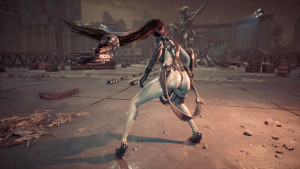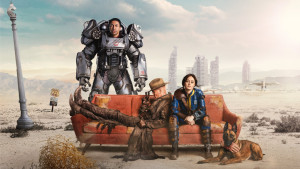Please support Game Informer. Print magazine subscriptions are less than $2 per issue
Codec Chatter: Uncharted 2/Firefly Composer Greg Edmonson
Uncharted 2: Among Thieves is one of the most cinematic experiences in gaming history, due in no small part to its amazing soundtrack, which was written by veteran Hollywood composer Greg Edmonson. I recently chatted with Edmonson about his work on the Uncharted series and his previous work on the cult classic sci-fi western Firefly.
You’re most famous among gamers and sci-fi fans for your work on Firefly. That show is so beloved by so many people; talk about the experience of working on that show with Joss Whedon.
It was spectacular, for a thousand different reasons. Number one, I think Joss Whedon is a genius. That show could have and should have run for ten years. He did it in such a way that it didn’t have to repeat itself. You had nine characters with wildly divergent background. The stories could have gone on forever. Then, look at the casting. That was the best casting I’ve ever seen. Every actor was perfect in their role, and they were all different.
It was so much fun to do and so inspiring. And Uncharted was a bit like that. In fact, it was exactly like that. Doing the cinematics in this game, you had really good acting and really good visuals. For a guy like me who likes to write to pictures, that was so much fun. But, yes, Firefly was a lot of fun and was actually my connection to the first Uncharted.
So Naughty Dog were fans of your work on the show?
Apparently, they were doing a trailer for E3 and they were listening to various things against the trailer. Amy Hennig [Naughty Dog creative director – Ed.] who is my wonderful contact at Naughty Dog, responded to something I did for Firefly. They called and asked if I was interested. I came down, and they said, “We’re doing this video game are you interested in taking a shot at it?” That wasn’t really my past history but I wanted to try. I ended up doing it and had the time of my life. That led to number two. Uncharted 2 is very different from the first, in both story and music.
How did the collaborative process work with you and Naughty Dog? How did you establish the musical vision?
I remember this one better than the first one, but the team was essentially the same. I’m fortunate to be surrounded by so many talented people. At Naughty Dog, I primarily deal with Amy, who is the writer and makes the acting and casting decisions. The Sony music team, which is led by Jonathan Mayer [Sony music manager – Ed.], is responsible with integrating the music into the game. They interact between me and Amy. We put our heads together. Amy knows what she’s trying to do storywise, but Jonathan is going to be the one that actually puts it into the game with his team. So, Amy may say, “We’re doing this combat scene in a war zone.” When you first get started, that level might not exist yet, so you have to use your imagination. Sometimes, I’m able to squeeze some really rough gameplay out of them, but they are reluctant to give it to me because it looks nothing like it’s going to look like at the end. But sometimes looking at anything is better than nothing.
Sometimes, Jonathan will step in and say, “Well, we have a lot of high intensity combat music, let’s do this as a medium intensity piece.” His input is there as well. From there, I just start writing and see what comes out. What’s really fun is that sometimes you write something for a level that’s a war zone, you find that something you wrote for another level actually works better there. Everything doesn’t end up where it’s intended, you just hope that it serves the story and the game and makes it exciting for the gamer.
Is that modular process different from how you would work for a movie?
I’m not sure the process is different. But for a movie you’re never asked to write music before there’s something to look at. What you’re looking at determines what you do. Here, you have to use your imagination. My experience doing games is pretty limited – Uncharted and Uncharted 2. By now, we’re on the same page. I learned a lot between the first and second game.
Games often shift gears very quickly between dialogue and action. A tender scene can quickly break out in a gunfight. Do you work with the team to create a soundtrack that can cue to what the player’s doing onscreen?
Yes, that’s exactly it. I wasn’t doing games in the old days, but the way game guys would write was limited by the engine that was available to you. You would have a bunch of layers going at one time. Then, let’s say the player got into a more difficult situation, and they would unleash another layer to ratchet up the tension. Now, the game engine is much more sophisticated, so when you go to an event, instead of having to just open and close layers, you can immediately shift to a different piece of music. You can write music that stands on its own instead of layers. I tend to think of music as one thing, not layers, but that’s what they had to do. Even during the course of Uncharted 2, the engine kept getting more sophisticated where we could leap from piece to piece of music. It’s very cool.
So you don’t have any limitations because this music is for a game and not a movie. You can go full on.
That’s the way I approach the music. I don’t know how much music I wrote for this, maybe up to two hours – it’s a lot. But the game stretches for 10 plus hours. So Jonathan and his team have to deconstruct the music for different sections. Sometimes they’ll say, “Hey we’re early in the stage, let’s just hear the low brass then bring in the strings.” Another thing they are good at is utilizing is silence. One of the things that makes music so special is when it’s not going all the time. If you’ve got a game that looks stunning and have good sound design, you don’t always have to have music. You wait for the moment. Maybe you’re battling mercenaries, and then all of a sudden in comes a helicopter. That’s a great time to bring in music because the addition increases the drama. But those decisions aren’t up to me. I write the music as a monolithic piece of music, just as I would for a TV show or a film. They find the way to integrate it into the game. The only music that’s in the game exactly how I wrote it is during cinematic cutscenes, because they are just little movies. But I’m always astonished by how they take the music and make something cool out of it. The whole team that was involved in this experience were as good as it gets.
Your style seems to be a real hybrid of a lot of different styles of music. Sometimes it evokes traditional film scores or light classical, but there are also tinges of more rock oriented percussion, or even Western and world music elements? How did you develop your voice as a composer?
I wish I knew the answer to that. I think that I just like all those elements. With Firefly, one of the fun things that Joss’s vision was of this post-apocalyptic world where all the cultures were thrown together in a melting pot. Your experience could be anything. It was the same way in the earlier times in our country. If you were staking a claim in Missouri your experience was very different than if you were a Rockafeller in New York City. So, he wrote something where everything made sense. You could have pistols or laser guns.
With Uncharted, the ethnic and world music elements add flavor and take you to a certain place. They establish where you are. With this one, when they started talking about it I knew there would be a lot of good possibilities because we were going to be in Tibet, and Nepal, and Turkey – all these interesting places. It’s great to be able to use all those colors. As far as big drums go, that’s part of the fabric of both the Uncharted games. It’s the signature sound of the series. Percussion pushes the action along. For this one, we had a much larger orchestra. Once again, I have to give kudos to Naughty Dog, because everything we asked for, they let us have.
How big was your orchestra?
It wasn’t that huge; it was about 75 guys.
That sounds pretty big!
Yeah, and we weren’t using any woodwinds, so that’s a pretty good size. It was fun, and we had them for days – not just one day. We did some at the beginning and then at the end we were able to go back and record the cinematics with the orchestra, which we did not do in the first game. So we didn’t have any synths except for something we wanted, like an ambient sound. We got to use the real deal. Naughty Dog really made it happen, and I think it makes a difference. I can’t tell you how proud I am to be associated with these guys.
To hear some samples of the Uncharted 2 soundtrack, check out our Special Edition Uncharted 2 Podcast.











